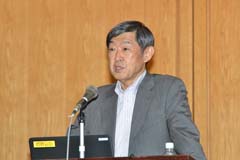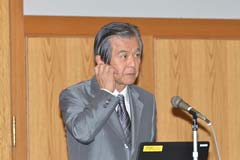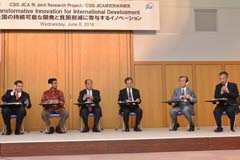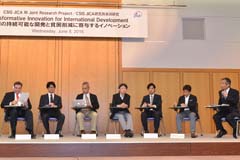Public Seminar "CSIS-JICA RI Joint Research Project on Transformative Innovation for Sustainable Development and Poverty Reduction: Innovation Ecosystems and Smart Cities"
2016.06.16
On June 8, the JICA Research Institute (JICA-RI) hosted representatives from the Center for Strategic and International Studies (CSIS) in Tokyo, Japan for the launch of their new joint report "Transformative Innovation for International Development." The report examines the potential for specific approaches to lead to transformative innovation and high-yield economic growth in developing countries. The approaches discussed in the report are building smart cities and innovation ecosystems, and these two topics were the focus of the day's events.
In the afternoon of June 8, the events commenced with an opening address by Shinichi Kitaoka, President of JICA. Kitaoka discussed how science and technology are playing an important role in achieving strong, sustainable and resilient international development, and how Japan and the United States are leading the way. Kitaoka's speech was followed by a keynote address by Hiroshi Komiyama, Chairman of the Institute at Mitsubishi Research Institute, Inc. Komiyama is also the President of the Platinum Society Network and served as the 28th President of the University of Tokyo. Komiyama presented about the new industries and ways of thinking necessary to build a "Platinum Society," or a society that provides a high quality of life. This is especially relevant in aging countries where baseline prosperity has already been achieved.

Shinichi Kitaoka, President of JICA
Following these remarks, Session 1 on Smart Cities began. Naohiro Kitano, Director of JICA-RI, opened the session and invited Daniel F. Runde, Director of the CSIS Project on Prosperity and Development, to provide remarks on the smart cities chapter of the CSIS and JICA-RI joint report. Runde emphasized the importance of both adopting new technologies that enable energy efficiency and higher quality of life and enabling capable public administration in building smart cities. Following these remarks, Setiaji, Head of the Jakarta Smart City Management Unit, who traveled from Indonesia to join the events, spoke about how Jakarta sees a smart city as one where there is a "government that listens, a system that connects, and a citizen that participates." Setiaji said that Jakarta is enabling this via providing one-stop service centers, analyzing and responding to data from sensors throughout the city, and building new smartphone applications that facilitate better communication between the city government and its citizens. Next, Hisakazu Okamura, Professor in the Faculty of Urban Innovation at Asia University, provided remarks on the evolution in language around and interpretation of smart cities and introduced the new "Smart City of Resilience" project. Next, Toshiharu Ikaga, Professor at Keio University, shared information about the Comprehensive Assessment System for Built Environmental Efficiency (CASBEE) indicators and shared examples of where CASBEE has been used to measure the performance of cities, including in Iskandar, Malaysia.

Hiroshi Komiyama, Chairman of the Institute at Mitsubishi Research Institute, Inc.
Next, Komiyama provided follow-up remarks where he posed the question of whether developing countries are taking the same paths to building smart cities as those taken by developed countries. Runde then emphasized the importance of capable public administration in building smart cities in developing contexts. Finally, Kitano facilitated a question and answer session with the audience with questions that included the role of political will in building smart cities, how impact evaluations are used to analyze the results of smart cities, and how Jakarta's Smart City Management Unit is addressing the informal settlements in Jakarta.

Panel members discuss Smart Cities in session 1
After an intermission, the audience reconvened for Session 2 on Innovation Ecosystems. Kitano opened the session and invited Runde to provide remarks on the innovation ecosystems chapter of the CSIS and JICA-RI joint report. Runde emphasized the importance of international development donors and organizations catalyzing innovation in developing countries by supporting innovation platforms, including Fabrication Laboratories (Fab Labs). Next, Hiroya Tanaka, Professor at Keio University SFC, discussed how Fab Labs are both a local engine for innovation and a connector to a global network. Fab Labs enable innovation, or "the creation of something that does not exist at this moment," he said. Next, Toshiya Jitsuzumi, Professor at Kyusyu University, provided remarks on how Fab Labs can enable a person with a great idea to meet unsatisfied local needs. He also discussed the importance of networking Fab Labs to share knowledge.
Next, Tomoaki Watanabe, Executive Research Fellow at the Center for Global Communications at the International University of Japan (GLOCOM), presented key challenges facing Fab Labs as innovation ecosystem catalysts in developing countries. He discussed the importance of achieving financial sustainability in the long-run, which requires visible success, and the necessity of creating new vehicles for investments in start-ups and entrepreneurs that emerge from Fab Labs. Next, Yutaka Tokushima, Board Member at the Fab Lab Asia Foundation, presented on new opportunities that maker spaces such as Fab Labs can bring to developing countries. He spoke specifically about the JICA-sponsored Fab Lab Bohol in the Philippines, discussing its work to upcycle local waste plastic into products that generate local income. Next, Tomoyuki Naito, Senior Advisor for ICT and Development at JICA, provided remarks on how JICA and other international development agencies are taking advantage of Fab Labs. He included an overview of the JICA and Solid Works sponsored Fab Lab in Rwanda and spoke about the enabling environments and actors necessary to sustain an innovation ecosystem.

Panel members discuss Innovation Ecosystems in session 2
Following remarks by the panelists, Kitano facilitated a question and answer session with the audience with questions that included the evolution of start-up incubators and how they relate to Fab Labs, how Fab Lab Bohol provides training to local users on its equipment, and how stakeholders consider the role of locally produced products versus mass-produced products. Kitano then thanked the panelists and the audience, reminded everyone to read the CSIS and JICA-RI joint report, and concluded the session.
External related link:

事業事前評価表(地球規模課題対応国際科学技術協力(SATREPS)).国際協力機構 地球環境部 . 防災第一チーム. 1.案件名.国 名: フィリピン共和国.

事業事前評価表(地球規模課題対応国際科学技術協力(SATREPS)).国際協力機構 地球環境部 . 防災第一チーム. 1.案件名.国 名: フィリピン共和国.

事業事前評価表(地球規模課題対応国際科学技術協力(SATREPS)).国際協力機構 地球環境部 . 防災第一チーム. 1.案件名.国 名: フィリピン共和国.

事業事前評価表(地球規模課題対応国際科学技術協力(SATREPS)).国際協力機構 地球環境部 . 防災第一チーム. 1.案件名.国 名: フィリピン共和国.

事業事前評価表(地球規模課題対応国際科学技術協力(SATREPS)).国際協力機構 地球環境部 . 防災第一チーム. 1.案件名.国 名: フィリピン共和国.
scroll